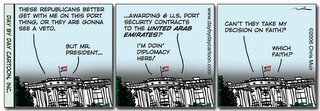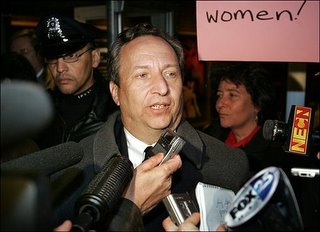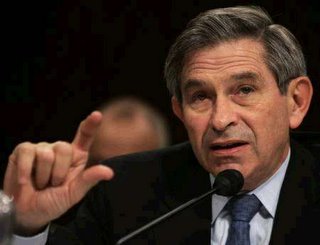
I have not posted yet regarding the current rhubarb over giving the UAE operational control over US ports because it is a subject about which I know little, and one where the available information is changing almost hourly. All I know is that this is important. Lileks captures the moment perfectly. He writes:
[T]he specifics don’t matter; arguments about the specific nature of the Dubai Ports World organization’s global reach and responsible track records don’t matter. Because it feels immediately, instinctively wrong to nearly every American, and that isn’t something that can be argued away with charts or glossy brochures. It just doesn’t sit well. Period. It’s one thing for an Administration to misjudge how a particular decision will be received; it’s another entirely to misjudge an issue that cuts to the core of the Administration’s core strength. That’s where you slap yourself on the forehead in the style of those lamenting the failure to request a V-8 in a timely fashion. Doesn’t matter whether it was a deal struck between the previous administrators and the UAE; that’s not how the issue will be seen. And it certainly doesn’t matter once the President gets all stern on the topic and insists he’ll veto any attempt to keep the deal from going through. At that point, millions of previously resolute supporters stand there with their mouths open, uttering a soft confused moan of disbelief.
Read him
here.
This is an important issue on so many levels.
1) Political: this provides Democrats with an opportunity to take a position to the right of the administration in the war on terror and they are making the most of it. It also hurts Bush with his base which is, as Lileks notes, simply stunned by the decision and the President's strong support for it. Finally, it forces Republicans to run for cover by distancing themselves from the President.
This is not how you build a permanant political majority, but then that's not what this presidency is all about. Bush has never seemed to care that the Democrats might regain control of one or more of the branches of government. Instead he has sought to build ties to the moderate wing of the Democratic Party, to set in place long term policies and projects that will eventually transform the political culture, and to reform the instruments of government hoping that in the long run governance, rather than partisan squabbling, will be what matters most.
2) Institutional: Under our constitutional system the relationship between Congress and the Executive is always in a state of flux. Congress is constantly attempting to intrude into areas of executive responsibility and Presidents are always attempting to extend the areas of executive prerogative. Under strong presidents that zone of prerogative expands, under weak ones it contracts.
During WWII and through the early stages of the Cold War, presidential power grew until by the time of Lyndon Johnson critics in both major parties were complaining of an "imperial presidency." Then, after Watergate, Vietnam, and the collapse of the Great Society, and during the diminished presidencies of Ford and Carter, power shifted back toward Congress which began to claim the right to exercise oversight on a wide range of diplomatic, intelligence and military issues. Presidents never acknowledged any such right, but it stood as a fait accompli until recently. Now Bush has begun to push back and congresscritters are squawking again about an imperial presidency. The port debate is just a skirmish in that interminable conflict, one in which congressional spokesmen are asserting the right to investigate and to approve or disapprove foreign access to American businesses. Micromanagement anyone?
3) Federal: Under our federal system conduct of foreign affairs is the responsibility of the central government. States and local governments are prohibited from interfering in such matters. But the ports controversy has raised a row in several states with affected ports.
Here in Maryland Gov. Ehrlich and Baltimore's Mayor Martin O'Malley have both promised to use every power available to them to block any UAE takeover of port facilities. [
here] Lt. Gov. Steele has been all over the media denouncing the deal and calling for a Congressional investigation. No word yet from Ben Cardin or Kweisi Mifume, but you can bet the will also denounce it. In other words local and State authorities are demanding some say in the formulation of policies that will directly affect their constituents. O'Malley's obstructionist rhetoric, which has been quite over the top, resonates to some extent with the old arguments advanced by "nullification" theorists before the Civil War.
4) Diplomatic: In terms of foreign policy the deal makes a lot of sense.
Bush's strategy has always been to isolate radical Islamists and regimes that support them while building political, economic, and ideological ties to cooperative Islamic regimes. In this context rewarding a staunch ally in the war on terror makes perfect sense as a demonstration of our good will and an encouragement to other governments in the region to cooperate with us in the greater war on terror.
Conversely if the deal had been denied it would have been confirmation of the charge made throughout the Islamic world that the US is a racist, anti-Arab, anti-Muslim culture. To foreign policy elites the deal is a no-brainer.
I might also point out that if the confrontation with Iran erupts into a shooting war, Dubai will be an invaluable ally.
5) Political culture: The controversy has exposed the underside of American political culture.
It is fascinating to note how easily Democrat demagogues slip into essentialist arguments that carry serious racist overtones. One of the dirty little secrets of contemporary American liberalism is that it embraces protectionist, even isolationist and racist, positions but masks that fact by invoking unworkable ideals of "collective security" and a non-existent "community of nations" and deferring to international organizations that can be counted on not to act. Democrats are eternally waiting for the "international community" to act, but it never does, and that suits them just fine.
The controversy has also exposed a deep sense of distrust among conservatives of the Bush presidency. The Republicans' dirty little secret is that the Bush administration, and the policy elites in general, are not really conservative in any meaningful sense of the term. As the attached cartoon illustrates conservatives no longer have faith in George Bush on much of anything, including national security issues. That ideological fissure within Republican ranks could prove fatal to the party's majority in the future.
Two things stand out in the welter of controversy surrounding the ports policy.
First, all sides complain about a failure to communicate. The administration did not consult extensively with Congress or with the affected State and city governments, nor with labor or business interests that would be affected. Most importantly there was no coordinated effort to "sell" the policy to the American public. That has become something of a pattern in the second term and lies at the heart of much of Bush's current political trouble.
Second, Beltway policy elites in are manifestly out of touch with the real concerns of the American people. This is true not just of the Bush team, but also the left-wing activists in the Democrat Party. National policy debates take place on terms that look good in the little political magazines or on the blogosphere, but have little relevance to real people's lives. It would be a tremendous boon to the entire system if people near the top of the political establishment would stop talking to each other, to journalists or to activists and instead just drop in for a chat with some county commissioners for a change. They would get a rude and necessary awakening.
The Port deal is probably not that important in and of itself, but the reaction to it is terribly important as an indicator. There's something big brewing just under the surface and it will probably erupt in the coming election season. George Bush came to office with a stated determination to shake things up, to do away with business as usual. He has done that, to be sure. But in doing so he has unleashed forces that neither he nor anyone else can fathom much less control. We are living in "interesting times" and we are embarking on a wild ride into the unknown for which the past is no sure guide. All I can say is, keep your seatbelts fastened and..., stay tuned.
UPDATE:
One good thing coming out of this debate. The
Wall Street Journal takes a look at the inadequacy of current security at our ports, especially the one in "gulp" Baltimore. Check it out
here. Since both the Mayor of Baltimore and the Governor of Maryland have some responsibility in the matter, and they are running against each other in the fall this could become a huge political issue here in Charm City.
Jim Glassman defends the deal and makes some good points
here.


























